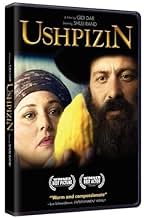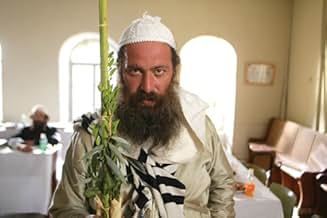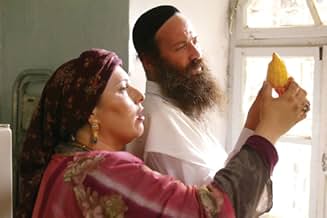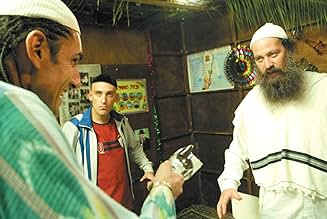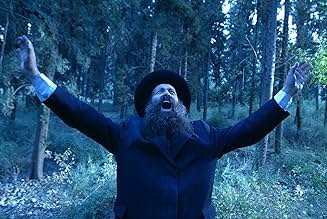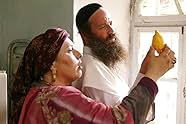VALUTAZIONE IMDb
7,3/10
2172
LA TUA VALUTAZIONE
Aggiungi una trama nella tua linguaAn Orthodox Jewish couple's faith is tested after praying to the Lord for a child on the Succoth holiday.An Orthodox Jewish couple's faith is tested after praying to the Lord for a child on the Succoth holiday.An Orthodox Jewish couple's faith is tested after praying to the Lord for a child on the Succoth holiday.
- Regia
- Sceneggiatura
- Star
- Premi
- 1 vittoria e 4 candidature totali
Daniel Dayan
- The Rabbi
- (as Rabbi Daniel Dayan)
Michael Weigel
- Ethrog Assessor
- (as Michael Vaigel)
Recensioni in evidenza
"Ha Ushpizin" is like a cross between Isaac Bashevis Singer and O. Henry stories brought to life in contemporary Jerusalem.
Set just before and during the fall harvest festival of Succoth, it is a modern retelling of the story from Genesis and its accompanying Midrash (extra-Biblical story) of Abraham encouraging guests (the title in Aramaic) to his house, that has become a mitzvah (obligation) for holidays. It is a thoroughly charming story of faith and love - and how maintaining both is a daily struggle requiring patience and humor and can even replace therapy.
What makes the film so involving emotionally is the superb acting. In Q & A at the Tribeca Film Festival the Orthodox writer/star and secular director explained they came up with the film, which was inspired by an actual incident that is used as a plot point, and worked diligently to get rabbinical approval by meeting certain restrictions, in order to put a human face behind the head coverings and beards of the Ultra Orthodox in Israel to help ease the tensions between their community ("the Hats" as they are called in short hand) and the majority secular citizens of Israel.
Shuli Rand was a leading film and theater actor before he gave up a secular life for a religious one, much as his character has only been religious for a few years after a somewhat shady past that in the film literally comes back to haunt him. His wife and co-star Michal Bat-Sheva Rand had been a theater director in her past and only agreed to act in this film as that was one of the rabbi's requirements for approval; a story about a couple had to be portrayed by an actual married pair. Practically swaddled burkha-like and almost as wide as she is tall, she unpredictably dominates the screen and takes it above any other more anthropological film about traditional families from any part of the world.
The modern sociological examinations are limited to having the only secular characters in the film be somewhat stereotyped; the kindliest one can say about them is that they are like citizens of Chelm or descendants of Vladimir and Estragon when they are comic relief or a menacing Laurel and Hardy.
There is some gentle clear-eyed look at the Ultra Orthodox as not serving in the Army and living only on charity that they mostly collect like Hare Krishnas in the street or from guilt-ridden Modern Orthodox businessmen that is then distributed based on the internal politics of their affiliated yeshiva.
I also have qualms about prayer being used for such personal propitiation as the couple do here, but that aspect is directed so delightfully and heartwarmingly that it's Scrooge-like to complain.
The visuals of the community of Mea Shearim, the Ultra-Orthodox Jerusalem neighborhood where the film is set, with the temporary Succoth (booths for outdoor eating) set up throughout of various materials, are marvelous views that outsiders rarely get to see.
When it is released in Fall 2005 in the U.S. (with special screenings set up for the Hassidic communities that cannot attend secular theaters with mixed audiences) I doubt viewers will get to participate in the kind of lively and colorful audience I did at the Museum of Jewish Heritage which included almost every possible age and affiliation of New York Jews, particularly from Brooklyn, and some non-Jewish out-of-towners in for the Festival.
But all the Orthodox attendees wanted to know was how the secular director could not be inspired to take the pledge, as it were, after making such a film? He pointed out that his sound designer was so inspired - who stood up to much cheering from many in the crowd.
Set just before and during the fall harvest festival of Succoth, it is a modern retelling of the story from Genesis and its accompanying Midrash (extra-Biblical story) of Abraham encouraging guests (the title in Aramaic) to his house, that has become a mitzvah (obligation) for holidays. It is a thoroughly charming story of faith and love - and how maintaining both is a daily struggle requiring patience and humor and can even replace therapy.
What makes the film so involving emotionally is the superb acting. In Q & A at the Tribeca Film Festival the Orthodox writer/star and secular director explained they came up with the film, which was inspired by an actual incident that is used as a plot point, and worked diligently to get rabbinical approval by meeting certain restrictions, in order to put a human face behind the head coverings and beards of the Ultra Orthodox in Israel to help ease the tensions between their community ("the Hats" as they are called in short hand) and the majority secular citizens of Israel.
Shuli Rand was a leading film and theater actor before he gave up a secular life for a religious one, much as his character has only been religious for a few years after a somewhat shady past that in the film literally comes back to haunt him. His wife and co-star Michal Bat-Sheva Rand had been a theater director in her past and only agreed to act in this film as that was one of the rabbi's requirements for approval; a story about a couple had to be portrayed by an actual married pair. Practically swaddled burkha-like and almost as wide as she is tall, she unpredictably dominates the screen and takes it above any other more anthropological film about traditional families from any part of the world.
The modern sociological examinations are limited to having the only secular characters in the film be somewhat stereotyped; the kindliest one can say about them is that they are like citizens of Chelm or descendants of Vladimir and Estragon when they are comic relief or a menacing Laurel and Hardy.
There is some gentle clear-eyed look at the Ultra Orthodox as not serving in the Army and living only on charity that they mostly collect like Hare Krishnas in the street or from guilt-ridden Modern Orthodox businessmen that is then distributed based on the internal politics of their affiliated yeshiva.
I also have qualms about prayer being used for such personal propitiation as the couple do here, but that aspect is directed so delightfully and heartwarmingly that it's Scrooge-like to complain.
The visuals of the community of Mea Shearim, the Ultra-Orthodox Jerusalem neighborhood where the film is set, with the temporary Succoth (booths for outdoor eating) set up throughout of various materials, are marvelous views that outsiders rarely get to see.
When it is released in Fall 2005 in the U.S. (with special screenings set up for the Hassidic communities that cannot attend secular theaters with mixed audiences) I doubt viewers will get to participate in the kind of lively and colorful audience I did at the Museum of Jewish Heritage which included almost every possible age and affiliation of New York Jews, particularly from Brooklyn, and some non-Jewish out-of-towners in for the Festival.
But all the Orthodox attendees wanted to know was how the secular director could not be inspired to take the pledge, as it were, after making such a film? He pointed out that his sound designer was so inspired - who stood up to much cheering from many in the crowd.
Ushpizin is about a "chozer b'tshuva" (recently religious) Jerusalem couple whose faith is tested repeatedly during the Succot holiday. Will their faith hold as the tests get harder and harder? Will G-d send them the miracles they need? Familiar references spring to mind, from the biblical story of Avraham and Sarah, to traditional tales of shtetl life, to the stories of S.Y. Agnon. Yet the contemporary context makes it a highly original work. The film manages to retain and build dramatic tension. It successfully portrays strong emotions including anger, frustration, love, gratitude, and faith without becoming overly sentimental.
The main couple is played by actors who are married in real life and also religious in real life (he wrote the script). Their love, clearly visible, is one of the nicest parts of the story.
The criminals who come to stay as guests during the holiday ("Ushpizin" in Hebrew) are a bit too cartooned at times, but are not all bad.
It's nice to see a Jerusalem that really exists: a place of material poverty but spiritual wealth, home to an imperfect but caring community that finds meaning in the fulfillment of mitzvahs (commandments).
The main couple is played by actors who are married in real life and also religious in real life (he wrote the script). Their love, clearly visible, is one of the nicest parts of the story.
The criminals who come to stay as guests during the holiday ("Ushpizin" in Hebrew) are a bit too cartooned at times, but are not all bad.
It's nice to see a Jerusalem that really exists: a place of material poverty but spiritual wealth, home to an imperfect but caring community that finds meaning in the fulfillment of mitzvahs (commandments).
This was a delightful movie in so many ways.
First, I really enjoyed the overall depiction of what was for me a very different cultural setting ... both regarding the religious context (Ultra-Orthodox Judaism) and the geocultural context (contemporary Israel, especially contemporary Jerusalem). I certainly can't comment on authenticity; but the overall flavor was convincing and the often exotic (to me) happenings, sayings, behaviors, etc were to me very appealing.
Second, the characters of Moshe and Malli were simply wonderful and wonderfully appealing. Their relationship was vivid; and the window into how an Orthodox marriage relationship "works" in the context of a strong Faith commitment by both of the couple was such a bracing experience for me.
Third, the general plot-theme ... two escaped convicts showing up and both challenging and straining Hospitality ... is very appealing to me. The characters of the convicts ... Scorpio and Yossef ... were much less appealing but certainly (uh) interesting.
Still the odd relationship between Moshe and Scorpio; and between Moshe and his wife and Scorpio and Yossef ... somehow lacked something that for me I could really find very convincing. The behavior of Scorpio and Yossef toward both their hosts, and to the general religious community on the street in which they were staying, was so attention-provoking that I had to ask myself what kind of escaped convicts want that kind of attention.
Yet all in all I really enjoyed this movie. And if you, like me, find this a pleasing but somewhat mystifying *cultural* challenge, hey, read some of the other comments on IMDb, there are some wonderful comments from Israel in particular that have shed much light for me.
First, I really enjoyed the overall depiction of what was for me a very different cultural setting ... both regarding the religious context (Ultra-Orthodox Judaism) and the geocultural context (contemporary Israel, especially contemporary Jerusalem). I certainly can't comment on authenticity; but the overall flavor was convincing and the often exotic (to me) happenings, sayings, behaviors, etc were to me very appealing.
Second, the characters of Moshe and Malli were simply wonderful and wonderfully appealing. Their relationship was vivid; and the window into how an Orthodox marriage relationship "works" in the context of a strong Faith commitment by both of the couple was such a bracing experience for me.
Third, the general plot-theme ... two escaped convicts showing up and both challenging and straining Hospitality ... is very appealing to me. The characters of the convicts ... Scorpio and Yossef ... were much less appealing but certainly (uh) interesting.
Still the odd relationship between Moshe and Scorpio; and between Moshe and his wife and Scorpio and Yossef ... somehow lacked something that for me I could really find very convincing. The behavior of Scorpio and Yossef toward both their hosts, and to the general religious community on the street in which they were staying, was so attention-provoking that I had to ask myself what kind of escaped convicts want that kind of attention.
Yet all in all I really enjoyed this movie. And if you, like me, find this a pleasing but somewhat mystifying *cultural* challenge, hey, read some of the other comments on IMDb, there are some wonderful comments from Israel in particular that have shed much light for me.
Positive depictions of haredi (so-called-ultra-Orthodox) lifestyle in film, whether American or Israeli, are not common. "Ushpizin" is a delightful little tale, almost a fable, with quite a bit of hidden depth.
Newly religious Moshe and Mali (real-life couple Shuli and Michal Bat-Sheva Rand) desperately need a miracle to get through the holiday of Sukkot. Without any support from Moshe's yeshiva, they are about to be overwhelmed by back rent and other debts. Strict believers in the Breslov tradition, they pray for a miracle, even as it unfolds (a brilliant 3-way inter-cut sequence that is the highlight of the film). Their joy is short-lived, however, when Elihayu and Yosef, unexpected guests from Moshe's pre-Haredi life, join them for the holiday.
The film is surprisingly honest -- Moshe and Mali are placed in the uncomfortable position of practicing genuine hospitality and tolerance to those who attitudes and actions place them diametrically opposed to everything the haredi couple stand for. Indeed, when Eliyahu and Yosef blast their music in the middle of the haredi neighborhood, a lynch mob nearly forms, the isolationist side of Haredi life raising its ugly head to keep its own courtyards clean of the outside world. There is a certain sense in the movie that Breslov chasidim distinguish themselves from the other sects in truly practicing love and outreach, coupled with unshakable belief.
Shuli Rand's portrayal of Moshe, which is probably more than a bit autobiographical, is dead-on: conflicted and uncomfortably reminded of a world he left far behind. The film makes a strong case for Divine Providence in every aspect of every individual's life, and for living up to the challenges and tests that G-d places before you.
Newly religious Moshe and Mali (real-life couple Shuli and Michal Bat-Sheva Rand) desperately need a miracle to get through the holiday of Sukkot. Without any support from Moshe's yeshiva, they are about to be overwhelmed by back rent and other debts. Strict believers in the Breslov tradition, they pray for a miracle, even as it unfolds (a brilliant 3-way inter-cut sequence that is the highlight of the film). Their joy is short-lived, however, when Elihayu and Yosef, unexpected guests from Moshe's pre-Haredi life, join them for the holiday.
The film is surprisingly honest -- Moshe and Mali are placed in the uncomfortable position of practicing genuine hospitality and tolerance to those who attitudes and actions place them diametrically opposed to everything the haredi couple stand for. Indeed, when Eliyahu and Yosef blast their music in the middle of the haredi neighborhood, a lynch mob nearly forms, the isolationist side of Haredi life raising its ugly head to keep its own courtyards clean of the outside world. There is a certain sense in the movie that Breslov chasidim distinguish themselves from the other sects in truly practicing love and outreach, coupled with unshakable belief.
Shuli Rand's portrayal of Moshe, which is probably more than a bit autobiographical, is dead-on: conflicted and uncomfortably reminded of a world he left far behind. The film makes a strong case for Divine Providence in every aspect of every individual's life, and for living up to the challenges and tests that G-d places before you.
This comedy which received Best Picture award from Israeli Critics in 2004 reveals a world that most of us don't know at all the world of pious, ultra-Orthodox Jews in the Jerusalem courtyards that seem to be indifferent to what century or even millennium is passing by. On the eve of the Jewish harvest holiday of Succoth, Moshe and Mali, a devoutly religious but impoverished couple, pray fervently for a miracle that they desperately need for money they need to build a Sukkah for holiday, for "ushpizin" ("holy guests") to share the holiday with, and for the most wonderful miracle of all, for a child they dream of but don't have. A series of unexpected events occur, including the appearance of two "unholy guests" two escaped parolees from Moshe's wild past. Moshe and Mali invited the guests to share the holiday with them, and more unpredictable events would follow...
"Ushpizin" is the first collaborative effort between Israel's religious and secular communities and it features many non-professionals who gave very good performances in the movie. Shuli Rand, the writer-star of the movie and his real life wife, Michal Bat-Sheva Rand played Moshe and Mali, and their chemistry is palpable and real contributing to this thoroughly charming story of faith, love, and devotion.
"Ushpizin" is the first collaborative effort between Israel's religious and secular communities and it features many non-professionals who gave very good performances in the movie. Shuli Rand, the writer-star of the movie and his real life wife, Michal Bat-Sheva Rand played Moshe and Mali, and their chemistry is palpable and real contributing to this thoroughly charming story of faith, love, and devotion.
Lo sapevi?
- QuizShuli Rand had two conditions for making this movie, both were met. The first was that his real-life wife, Michal Bat-Sheva Rand, would play his wife in the film. The second is that in Israel the film would not be screened on the Jewish Sabbath.
- Citazioni
[from trailer]
Narrator: They worked out of luck, out of hope. And faith was all they had to hang on to. But on this holy week, where guests are considered a blessing, these two unexpected visitors bring with them: a secret from the past. A secret that would test their love and challenge their faith. Now only a miracle will turn their fortune around.
- ConnessioniFeatured in Sharon Amrani: Remember His Name (2010)
I più visti
Accedi per valutare e creare un elenco di titoli salvati per ottenere consigli personalizzati
Dettagli
Botteghino
- Lordo Stati Uniti e Canada
- 1.400.666 USD
- Fine settimana di apertura Stati Uniti e Canada
- 64.423 USD
- 23 ott 2005
- Lordo in tutto il mondo
- 1.565.016 USD
Contribuisci a questa pagina
Suggerisci una modifica o aggiungi i contenuti mancanti

Divario superiore
By what name was Ha-Ushpizin (2004) officially released in India in English?
Rispondi




